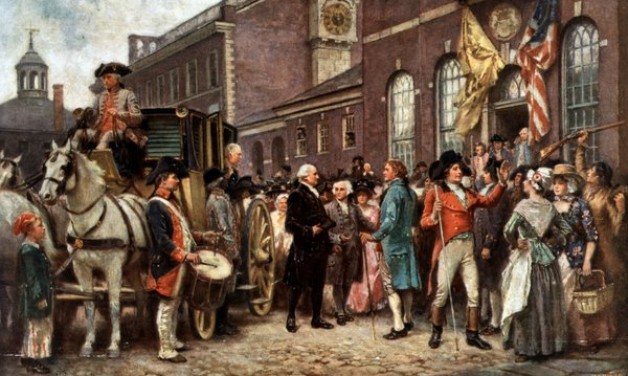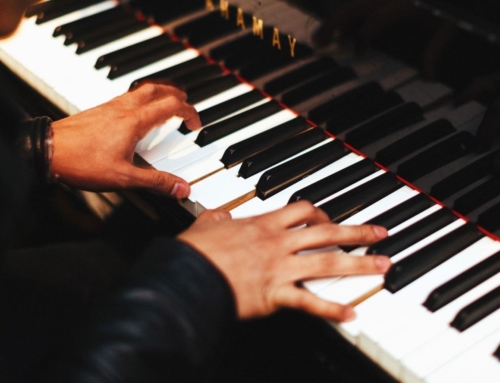Every four years, our republic celebrates the closest thing we have to a civic liturgy as we inaugurate the President of the United States for a term in office. Compared with coronations of monarchs in days of yore, it is an uncomplicated, straightforward ceremony. Yet for all its republican simplicity, the ritual itself is a powerful expression of who we are as a nation and of the self-government we have inherited from our fathers.
Amidst all the usual pomp of the swearing-in, the particulars of the 57th inaugural ceremony reveal just how much our nation has changed in recent years. Flipping from channel to channel, we were treated to fevered speculation about the designer of Mrs. Obama’s wardrobe (dress and coat by Thom Browne, accessories by J. Crew) and Beyoncé’s variations on the Star-Spangled Banner (was she lip-synching or not?). As the likes of Ke$ha and Kelly Clarkson, James Taylor and Jay-Z arrived on the platform, we searched for the nearest fainting couch just to be safe. After double checking that we were indeed watching network news and not Access Hollywood, it became hard to deny that the culture of celebrity has taken firm hold of every facet of our national life.
The roiling, interminable national discussion about homosexuality certainly loomed large throughout this inaugural. Even before the ceremony began, the President’s choice of a minister to give the inaugural benediction sparked controversy. Louis Giglio earned the swift and unrelenting censure of the left for a sermon in the 1990s in which he affirmed that homosexual acts were sinful and that all sinners required the healing power of Jesus. As a replacement, the President invited the Rev. Luis Leon, the rector of St. John’s (Episcopal) Church, where same-sex unions are solemnized. The inaugural poet, Richard Blanco, is himself an openly gay man, which predictably attracted more comment than his actual poem in many quarters.
President Obama made explicit reference to his support for “marriage equality” and LGBT rights during his inaugural address. In his speech, the President said, “Our journey is not complete until our gay brothers and sisters are treated like anyone else under the law, for if we are truly created equal, then surely the love we commit to one another must be equal, as well.” In linking Stonewall (considered the birthplace of modern gay-rights activism) with Seneca Falls and Selma, the President sought to establish an analogy between the three struggles: in other words, gay rights are civil rights.
This is part and parcel of a familiar progressive rhetorical strategy that seeks to portray the unfolding of this “rights narrative” as part of the inexorable march of history. Those who seek to prevent this forward progress are reactionaries who, like the Bull Connors of old, will receive the full condemnation of generations to come. The full force of this argument, and the broader push to marginalize all opposition to the gay rights agenda, is having its effect. Support for same-sex marriage is coming to be a sine qua non for social and political acceptability. In increasing measure, the traditional Christian view of marriage is seen as hopelessly backward at best and malevolently bigoted at worst. The President’s inclusion of gay rights in his inaugural paean to the story of American rights is a significant marker: it will soon become a heresy against our national civic religion to oppose these “rights.”
The incredible pace of change on these social issues is dizzying. Why, even the President himself only “evolved” to his present higher state of consciousness on the issue within the past year. It is a testimony to the effectiveness of the cultural campaign to change hearts and minds on social issues we took for granted just a decade ago. Similarly disturbing is how our very language of national identity has become impoverished and crimped. The living heritage of our history rooted in Western Civilization is now considered outmoded, tainted, and politically incorrect. Severed from our Christian roots, our postmodern political identity has only cold political abstractions in the form of rights language to offer as a substitute for a real community grounded in a common past.
As Catholics who defend the truth of the natural law and the meaning of marriage, we must be prepared for the deepening unpopularity of our beliefs. What lies ahead in the foreseeable future is not the shedding of martyrs’ blood or even the clanging of prison chains, but a far more insidious challenge to the faith: the systematic marginalization and mockery of the Church and her members. It is one thing to pat oneself on the back in the face of purely theoretical martyrdom, but it’s quite another to endure constant disapproval and dismissiveness at the water cooler, in the classroom, and at the town hall meeting.
We face temptations on every side in this struggle: to compromise what we know to be true, to retreat to the cozy safety of our ghettoes, or to become belligerent, red-faced blowhards in the face of this new consensus. To navigate these waters with charity and confidence requires a grace surpassing our own abilities and efforts, so let us pray to God for that sublime gift. In the face of the political and cultural wasteland we now behold, let us remember that the wellspring of a genuinely humane culture is the cross of Christ.
✠
Image: J. L. G. Ferris, Washington’s Inauguration at Philadelphia







